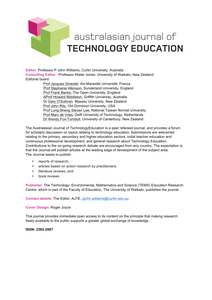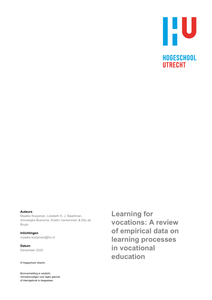Leerlingen voelen zich in digitale omgevingen vaak meer ontspannen om zich in de doeltaal te uiten. Om die reden is het project Doeltaal Digitaal gestart, waarbij leerlingen van alle niveaus (vmbo, havo, vwo) online betekenisvolle taaltaken uitvoeren via video- en audiogesprekken en geschreven chat.
DOCUMENT

Studenten opleiden tot professionals die kunnen leven en werken in de huidige complexe en diverse samenleving. Kunnen acteren met mensen van verschillende achtergronden en de verhoudingen in de wereld kennen. Wereldburgers opleiden die zelfbewust zijn en met een kritische en empathische blik naar de wereld om hen heen kijken. Zodat ze na hun opleiding professionals zijn die begrijpen dat onderwerpen door henzelf en anderen vanuit verschillende invalshoeken kunnen worden aangevlogen. En in staat zijn om oplossingen te vinden voor ingewikkelde vraagstukken. Dat is een leven lang leren! Aan die ontwikkeling draag jij als onderwijsprofessional, op jouw manier, bij. Maar, dat vraagt ook van jou om steeds meer te acteren op het snijvlak van de interne leeromgeving van school en een externe (leer)omgeving, waarbij het cocreëren met verschillende stakeholders steeds belangrijker wordt voor het slim vormgeven van leerprocessen. De afgelopen periode onderschrijft des te meer dat we in een sneltreinvaart toe bewegen naar het ‘nieuwe normaal’, waarbij van ons wordt verwacht om anders te werken én te denken. Ingesleten denk- en werkpatronen volstaan niet meer in onze internationale samenleving die steeds complexer en onvoorspelbaarder wordt. Je ontkomt pas aan die patronen door opnieuw te gaan denken, te leren afstand nemen van vooropgestelde ideeën over wat er zou moeten zijn en ontstane situaties als kansen voor ontwikkeling te zien. Juist in deze tijd is flexibilisering van het onderwijs en cocreatie hard nodig om bij te dragen aan het ‘nieuwe normaal’. Design Thinking is een gedachtegoed, aanpak en onderwijsmethodiek die hierbij kan helpen. Het is een manier om vanuit een mens-perspectief te kunnen vernieuwen. In deze Design Thinking ‘proeverij’ hebben we gepoogd onze ervaringen met Design Thinking in living labs voor business en management studenten te bundelen met ervaringen van anderen en theorie. Daarvoor hebben we ervaringen van andere hogeschooldocenten die Design Thinking reeds toepas sen in hun onderwijsomgevingen en een praktische vertaling van de theorie over Design Thinking & Doing gebruikt. Met als doel dat jij voor jezelf kunt gaan ontdekken of Design Thinking (& Doing) iets is voor jou, en voor jouw studenten. Wie weet, misschien ontdek je zelfs dat je al een onbewust, bekwame Design Thinker bent.
DOCUMENT

This paper presents a mixed methods study in which 77 students and 3 teachers took part, that investigated the practice of Learning by Design (LBD). The study is part of a series of studies, funded by the Netherlands Organisation for Scientific Research (NWO), that aims to improve student learning, teaching skills and teacher training. LBD uses the context of design challenges to learn, among other things, science. Previous research showed that this approach to subject integration is quite successful but provides little profit regarding scientific concept learning. Perhaps, when the process of concept learning is better understood, LBD is a suitable method for integration. Through pre- and post-exams we measured, like others, a medium gain in the mastery of scientific concepts. Qualitative data revealed important focus-related issues that impede concept learning. As a result, mainly implicit learning of loose facts and incomplete concepts occurs. More transparency of the learning situation and a stronger focus on underlying concepts should make concept learning more explicit and coherent.
DOCUMENT

This paper presents a mixed methods study in which 21 first-year student teachers took part that investigated learning outcomes of a modified learning by design task. The study is part of a series of studies that aims to improve student learning, teaching skills and teacher training. Design-based science challenges are reasonably successful project-based approaches for breaking down the boundaries between traditional school subjects. Previous learning outcomes of the extensively studied Learning by Design (LBD) approach demonstrated a strong positive effect on students’ skills. However, compared to traditional classroom settings, LBD provided little or no profit on (scientific) concept learning. For this, according to two preliminary studies, a lack of explicit teaching and scaffolding strategies, both strongly teacher-dependent, bears a share of responsibility. The results of this third study indicate that more emphasis on these strategies indeed strengthens concept learning without reducing positive effects on skill performance.
DOCUMENT

In this paper the focus is on professional development through informal learning. People learn a lot while performing tasks and doing their jobs, but they are not always aware of these processes. Encouraging the awareness for informal learning is a first step towards acknowledgement of informal learning activities as forms of professional development by teacher educators and their managers. In this paper, we describe a procedure to encourage awareness of informal learning. The procedure consists of keeping a logbook on learning experiences during three weeks. At the end of the period the participants discussed their experiences in a meeting and analysed their own logbooks using an analysis tool. Both keeping a logbook and analysing this logbook led to a raise in the awareness of informal learning, at least, during and shortly after the intervention. The participants got to know their own learning processes, found the logbook-keeping an interesting thing to do and sometimes were surprised by the ways they learned.
MULTIFILE
Learning by Design (LBD) is a project-based inquiry approach for interdisciplinary teaching that uses design contexts to learn skills and conceptual knowledge. Research around the year 2000 showed that LBD students achieved high skill performances but disappointing conceptual learning gains. A series of exploratory studies, previous to the study in this paper, indicated how to enhance concept learning. Small-scale tested modifications, based on explicit teaching and scaffolding, were promising and revealed improved conceptual learning gains. The pretest-posttest design study discussed in this paper confirms this improvement quantitatively by comparing the conceptual learning gains for students exposed to the modified approach (n = 110) and traditional approach (n = 77). Further modifications, which resulted in a remodified approach tested with 127 students, show a further improvement through reduced fragmentation of the task and addressed science. Overall, the remodified approach (FITS model: Focus - Investigation - Technological design - Synergy) enriches technology education by stimulating an empirical and conceptual way of creating design solutions.
DOCUMENT

Conference Paper From the article: Abstract Learning analytics is the analysis and visualization of student data with the purpose of improving education. Literature reporting on measures of the effects of data-driven pedagogical interventions on learning and the environment in which this takes place, allows us to assess in what way learning analytics actually improves learning. We conducted a systematic literature review aimed at identifying such measures of data-driven improvement. A review of 1034 papers yielded 38 key studies, which were thoroughly analyzed on aspects like objective, affected learning and their operationalization (measures). Based on prevalent learning theories, we synthesized a classification scheme comprised of four categories: learning process, student performance, learning environment, and departmental performance. Most of the analyzed studies relate to either student performance or learning process. Based on the results, we recommend to make deliberate decisions on the (multiple) aspects of learning one tries to improve by the application of learning analytics. Our classification scheme with examples of measures may help both academics and practitioners doing so, as it allows for structured positioning of learning analytics benefits.
DOCUMENT
In our professorship 'Learning Strategies' of the Fontys Secondary Teacher Training College Tilburg, we stress the importance of practitioner research for the professional development of teachers. To investigate our own beliefs, we started a project in which teachers learned to do practitioner research in their own schools. There were two questions we were interested in: 1) Which elements of the program are suitable to help teachers to learn do their own practitioner research? 2) What knowledge do teachers create in doing practitioner research? Several authors mention the benefits of practitioner research performed by teachers (Loughran et al, 2004; Zeichner & Noffke, 2001; Cochran-Smith & Lytle, 1999; Cochran-Smith, 2005; Huberman, 2002; Anderson & Herr , 1999; Robson, 1993, 2002; Onstenk, Kallenberg & Koster, 2007). Doing their own research would increase their professionalism as teacher. Although the relevance of practitioner research is stressed by many authors, not many teachers in the Netherlands are already actively doing practitioner research. Among other causes, the lack of experience in how to do practitioner research might be a barrier. We developed a program for teacher practitioner research, consisting of seven group sessions. In each session, attention was paid to theoretical backgrounds (formulation of a research question, choosing methods, obtaining and analyzing data, reporting on the findings) and to practical implications (participating teachers were advised by each other and by the supervisor). Most teachers worked together in a couple on their research project. The supervisor kept notes about difficulties and experiences of the teachers during the process and interviewed the teachers after they finished their research project. The answers to our research questions are: 1) The theoretical parts of the program were necessary for teachers to obtain knowledge about the (systematic) approach of research. The practical help of the supervisor was crucial during the process as the teachers were insecure about applying their newly obtained research knowledge in practice and needed help to do so. 2) Teachers obtained knowledge about performing practitioner research as well as knowledge about the problem they investigated in their school practice. Furthermore, they mention personal benefits such as 'another look at my profession', 'renewed motivation' and 'new insights'.
DOCUMENT
Uitwerking van het smart industry ecosysteem voor onderwijs en arbeid. Hierin aandacht voor Smart Industry en Formeel leren, Leven Lang Leren, flexibilisering en Learning by doing.
DOCUMENT

This article reports on a literature review on empirical research investigating learning for vocations in the context of vocational education. We included 36 studies in which learning for vocations is empirically studied. Learning for vocations is characterised based upon prevalent research traditions in the field and framed from the perspective of vocational education and organised learning practices. This framing and characterisation directed the search terms for the review. Results show empirical data on vocational learning and illustrate how learning processes for the functions of vocational education - vocational identity development, development of a vocational repertoire of actions, and vocational knowledge development - actually take place. The review further shows that, empirical illustrations of learning processes that occur in the context of vocational education and organised learning practices are relatively scarce. The findings can be typified in relation to our theoretical framework in terms of three learning processes, that is learning as a process of (a) belonging, becoming, and being, (b) recontextualization, and (c) negotiation of meaning and sense-making. We argue that more empirical research should be carried out, using the functions of vocational education and the three learning processes to better understand vocational learning.
DOCUMENT
